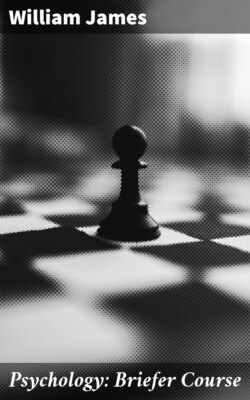Psychology: Briefer Course

Реклама. ООО «ЛитРес», ИНН: 7719571260.
Оглавление
William James. Psychology: Briefer Course
Psychology: Briefer Course
Table of Contents
PSYCHOLOGY
CHAPTER I. INTRODUCTORY
CHAPTER II. SENSATION IN GENERAL
CHAPTER III. SIGHT
CHAPTER IV. HEARING.[18]
CHAPTER V. TOUCH, THE TEMPERATURE SENSE, THE MUSCULAR SENSE, AND PAIN
CHAPTER VI. SENSATIONS OF MOTION
CHAPTER VII. THE STRUCTURE OF THE BRAIN.[28]
CHAPTER VIII. THE FUNCTIONS OF THE BRAIN
CHAPTER IX. SOME GENERAL CONDITIONS OF NEURAL ACTIVITY
CHAPTER X. HABIT
CHAPTER XI. THE STREAM OF CONSCIOUSNESS
CHAPTER XII. THE SELF
A) The Self as Known
B) The Self as Knower
CHAPTER XIII. ATTENTION
CHAPTER XIV. CONCEPTION
CHAPTER XV. DISCRIMINATION
CHAPTER XVI. ASSOCIATION
CHAPTER XVII. THE SENSE OF TIME
CHAPTER XVIII. MEMORY
CHAPTER XIX. IMAGINATION
CHAPTER XX. PERCEPTION
CHAPTER XXI. THE PERCEPTION OF SPACE
CHAPTER XXII. REASONING
CHAPTER XXIII. CONSCIOUSNESS AND MOVEMENT
CHAPTER XXIV. EMOTION
CHAPTER XXV. INSTINCT
CHAPTER XXVI. WILL
EPILOGUE. PSYCHOLOGY AND PHILOSOPHY
INDEX
Отрывок из книги
William James
Published by Good Press, 2019
.....
"We may therefore lay it down as a general rule that a stimulus, in order to be felt, may be so much the smaller if the already preëxisting stimulation of the organ is small, but must be so much the larger, the greater the preëxisting stimulation is. … The simplest relation would obviously be that the sensation should increase in identically the same ratio as the stimulus. … But if this simplest of all relations prevailed, … the light of the stars, e.g., ought to make as great an addition to the daylight as it does to the darkness of the nocturnal sky, and this we know to be not the case. … So it is clear that the strength of the sensations does not increase in proportion to the amount of the stimuli, but more slowly. And now comes the question, in what proportion does the increase of the sensation grow less as the increase of the stimulus grows greater? To answer this question, every-day experiences do not suffice. We need exact measurements, both of the amounts of the various stimuli, and of the intensity of the sensations themselves.
"How to execute these measurements, however, is something which daily experience suggests. To measure the strength of sensations is, as we saw, impossible; we can only measure the difference of sensations. Experience showed us what very unequal differences of sensation might come from equal differences of outward stimulus. But all these experiences expressed themselves in one kind of fact, that the same difference of stimulus could in one case be felt, and in another case not felt at all—a pound felt if added to another pound, but not if added to a hundredweight. … We can quickest reach a result with our observations if we start with an arbitrary strength of stimulus, notice what sensation it gives us, and then see how much we can increase the stimulus without making the sensation seem to change. If we carry out such observations with stimuli of varying absolute amounts, we shall be forced to choose in an equally varying way the amounts of addition to the stimulus which are capable of giving us a just barely perceptible feeling of more. A light to be just perceptible in the twilight need not be near as bright as the starlight; it must be far brighter to be just perceived during the day. If now we institute such observations for all possible strengths of the various stimuli, and note for each strength the amount of addition of the latter required to produce a barely perceptible alteration of sensation, we shall have a series of figures in which is immediately expressed the law according to which the sensation alters when the stimulation is increased. … "
.....